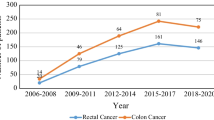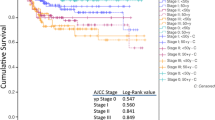Abstract
Background
Rectal cancer accounts for one-third of all colorectal cancer (CRC) cases. Due to physiological and anatomical differences, some researchers consider rectal cancer as a separate organ malignancy during the recent decades. However, limited studies have been conducted in this regard in Iran. Therefore, the aim of this study is to determine survival of rectal cancer and its, affecting factors in Fars province, southern Iran.
Methods
In this cohort study, we used the data of 387 patients with rectal cancer gathered by the Colorectal Research Center of Shiraz University of Medical Sciences between 2007 and 2015. The impact of 35 explanatory factors including demographic information, medical history, pathologic data, and imaging findings was evaluated using Cox regression analysis.
Results
Out of all patients, 111 ones (29%) died. The median follow-up period was 36 months. The patients’ mean age at diagnosis was 56.72 ± 13.89 years. Their 5-year survival was 65% (95% CI: 58–69%). The results of multiple Cox regression analysis showed that sex (male/female; HR = 1.73, 95% CI: 1.15–2.67), vascular invasion (yes/no; HR = 2.40, 95% CI: 1.45–3.99), and lymph node ratio (> 0.2 vs ≤ 0.2; HR = 2.19, 95% CI: 1.41–3.40) were significantly correlated to survival.
Conclusion
Various geographical parts of Iran show different rates regarding rectal cancer survival. A better 5-year survival rate was detected by this study for the patients with rectal cancer in Fars province, southern Iran, compared to many parts of the country. Moreover, gender, vascular invasion, and nodal status played an important role in survival of rectal cancer.



Similar content being viewed by others
References
Torre LA, Bray F, Siegel RL, Ferlay J, Lortet-Tieulent J, Jemal A. Global cancer statistics, 2012. CA Cancer J Clin. 2015;65(2):87–108. https://doi.org/10.3322/caac.21262.
Marley AR, Nan H. Epidemiology of colorectal cancer. Int J Mol Epidemiol Genet. 2016;7(3):105–14.
Arnold M, Sierra MS, Laversanne M, Soerjomataram I, Jemal A, Bray F. Global patterns and trends in colorectal cancer incidence and mortality. Gut. 2017;66(4):683–91. https://doi.org/10.1136/gutjnl-2015-310912.
Favoriti P, Carbone G, Greco M, Pirozzi F, Pirozzi RE, Corcione F. Worldwide burden of colorectal cancer: a review. Updat Surg. 2016;68(1):7–11. https://doi.org/10.1007/s13304-016-0359-y.
Rezaianzadeh A, Safarpour AR, Marzban M, Mohaghegh A. A systematic review over the incidence of colorectal cancer in Iran. Ann Colorectal Res. 2015;3(1):e25724. https://doi.org/10.17795/acr-25724.
Dolatkhah R, Somi MH, Bonyadi MJ, Asvadi Kermani I, Farassati F, Dastgiri S. Colorectal cancer in Iran: molecular epidemiology and screening strategies. J Cancer Epidemiol. 2015;2015:643020–10. https://doi.org/10.1155/2015/643020.
Bufill JA. Colorectal cancer: evidence for distinct genetic categories based on proximal or distal tumor location. Ann Intern Med. 1990;113(10):779–88.
Minoo P, Zlobec I, Peterson M, Terracciano L, Lugli A. Characterization of rectal, proximal and distal colon cancers based on clinicopathological, molecular and protein profiles. Int J Oncol. 2010;37(3):707–18.
Tamas K, Walenkamp AM, de Vries EG, van Vugt MA, Beets-Tan RG, van Etten B, et al. Rectal and colon cancer: not just a different anatomic site. Cancer Treat Rev. 2015;41(8):671–9. https://doi.org/10.1016/j.ctrv.2015.06.007.
Glynne-Jones R, Hughes R. Critical appraisal of the ‘wait and see’ approach in rectal cancer for clinical complete responders after chemoradiation. Br J Surg. 2012;99(7):897–909. https://doi.org/10.1002/bjs.8732.
Talaiezadeh A, Tabesh H, Sattari A, Ebrahimi S. Cancer incidence in southwest of Iran: first report from Khuzestan population-based cancer registry, 2002-2009. Asian Pac J Cancer Prev. 2013;14(12):7517–22.
Ali Hussein Alhurry AM, Rezaianzadeh A, Rahimikazerooni S, Abdzaid Akool M, Bahrami F, Shahidinia SS, et al. A review of the incidence of colorectal cancer in the Middle East. Ann Color Res. 2017;5(3–4):e46292. https://doi.org/10.5812/acr.46292.
Heidarnia MA, Monfared ED, Akbari ME, Yavari P, Amanpour F, Mohseni M. Social determinants of health and 5-year survival of colorectal cancer. Asian Pac J Cancer Prev. 2013;14(9):5111–6.
Aryaie M, Roshandel G, Semnani S, Asadi-Lari M, Aarabi M, Vakili MA, et al. Predictors of colorectal cancer survival in Golestan, Iran: a population-based study. Epidemiol Health. 2013;35:e2013004. https://doi.org/10.4178/epih/e2013004.
Fatemi SR, Pourhoseingholi MA, Asadi F, Vahedi M, Pasha S, Alizadeh L, et al. Recurrence and five -year survival in colorectal cancer patients after surgery. Iran J Cancer Prev. 2015;8(4):e3439. https://doi.org/10.17795/ijcp.3439.
Akhavan A, Binesh F, Soltani A. Survival of rectal cancer in Yazd, Iran. Asian Pac J Cancer Prev. 2014;15(12):4857–60.
Moradi A, Khayamzadeh M, Guya M, Mirzaei HR, Salmanian R, Rakhsha A, et al. Survival of colorectal cancer in Iran. Asian Pac J Cancer Prev. 2009;10(4):583–6.
Rasouli MA, Moradi G, Roshani D, Nikkhoo B, Ghaderi E, Ghaytasi B. Prognostic factors and survival of colorectal cancer in Kurdistan province, Iran: a population-based study (2009-2014). Medicine. 2017;96(6):e5941. https://doi.org/10.1097/md.0000000000005941.
Aarts MJ, Lemmens VE, Louwman MW, Kunst AE, Coebergh JW. Socioeconomic status and changing inequalities in colorectal cancer? A review of the associations with risk, treatment and outcome. Eur J Cancer (Oxford, England : 1990). 2010;46(15):2681–95. https://doi.org/10.1016/j.ejca.2010.04.026.
Wu L, Pang S, Yao Q, Jian C, Lin P, Feng F, et al. Population-based study of effectiveness of neoadjuvant radiotherapy on survival in US rectal cancer patients according to age. Sci Rep. 2017;7(1):3471. https://doi.org/10.1038/s41598-017-02992-7.
Russu PC, Molnar C, Gurzu S, Jung I, Voidazan TS, Copotoiu C. The role of clinical and pathological assessment in choosing the best therapeutic management to improve survival in rectal cancer. Rom J Morphol Embryol. 2016;57(4):1253–9.
Yokoyama S, Matsuda K, Watanabe T, Mitani Y, Ieda J, Iwamoto H, et al. Perineural invasion is associated with poor survival after preoperative chemoradiation therapy for advanced lower rectal cancer. Dig Surg. 2017;34(5):387–93. https://doi.org/10.1159/000453591.
Dianatinasab M, Ghaem H, Rezaianzadeh A, Hosseini SV, Khazraei H. Colorectal cancer mortality in Shiraz, Iran. Asian Pac J Cancer Prev. 2016;17(8):4101–5.
Ghabeljoo M, Jafarabadi MA, Mohammadi SM, Hajizadeh E, Kazemnejad A, Fatemi SR. Patterns of survival for anatomical sites of colorectal cancer with shift to advanced lesions in Iran. Asian Pac J Cancer Prev. 2011;12(5):1225–31.
Author information
Authors and Affiliations
Corresponding author
Ethics declarations
Conflict of Interest
The authors declare that there is no conflict of interest.
Additional information
Publisher’s Note
Springer Nature remains neutral with regard to jurisdictional claims in published maps and institutional affiliations.
Rights and permissions
About this article
Cite this article
Hosseini, S.V., Rezaianzadeh, A., Rahimikazerooni, S. et al. Prognostic Factors of Rectal Cancer in Southern Iran. J Gastrointest Canc 53, 113–121 (2022). https://doi.org/10.1007/s12029-020-00553-2
Accepted:
Published:
Issue Date:
DOI: https://doi.org/10.1007/s12029-020-00553-2




